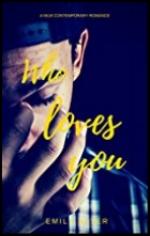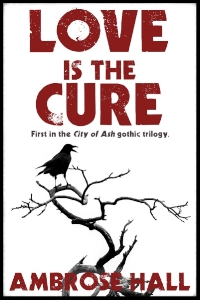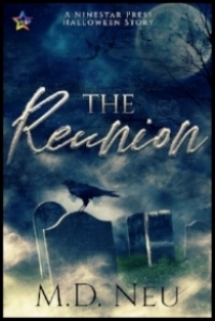Yes, so by Gods and Insects, he’s trying to find his own way, but he’s lost and lonely and still following mortal patterns of behavior. When two more experienced vampires come along and offer him a home and protection, it seems like a good deal. The hardest thing for Asher is, even though he’s quite naive, he has a strong sense of right and wrong. In Gods and Insects, I wanted to explore what it would look like for someone like Asher to fall from grace. I also wanted to explore identity and how that’s shaped by our experiences, including the more traumatic ones.
Well he certainly was a new man by book two and I really liked how he grew between books. I think it served him and the story well.
Thank you.
Now, I can see at least one more book in the series with how you ended this book (and thank you for giving it a proper ending and not having it end on a cliffhanger). How many books are planned for this series?
It’s going to be a trilogy. The third book will be from Nico’s point of view. He’s a character who appears halfway through Gods and Insects. He’s trans and I wanted to tell a story with a trans main character, as I am. He’s also quite different from most of the other characters as he’s very much of the modern world, he’s much more in touch with his emotions than any of the others, and he has quite a different outlook. Unlike Kerrick and Asher, he’s also not a fighter.
Nico, was very different from all the other characters and I really like the contrast. Honestly, he surprised, in a good way. It was this breath of fresh air and kind of highlighted everything that is ‘wrong’ with the other characters. If that makes sense. He’s also one of my favorite characters in this story.
He was, also, one of the favorite characters from the second book, from feedback I received, so he seemed like a good choice. The third book will follow his story, with the vampiric war continuing in the background and his growing relationship with Asher. All the books have looked at power dynamics, in and out of relationships, and the nature of power is going to be a big theme in this final story.
Without giving much away, I enjoyed the ending of this book. You could have gone very dark, but you didn’t. You kind of ended the book as I thought you would a middle ground was reached. Was that your intention? Not to have an overly dark ‘end of the world’ feel to the ending.
Gods and Insects is a tragedy for Asher, but in the sense that he embraces more of his vampiric nature. But he’s only at the start of that path. But there are still others in Asher’s life, particularly Kerrick and Nico, who have their own way of doing things. Nico is still very young and very human and he connected to the good in Asher. Kerrick is more violent, because he was raised in a violent time and had a traumatic start to life, but he’s also very caring and protective of Asher, as his child. Inevitably, there will be some conflict between those different paths.
You and I both love vampire stories and we have a totally different take on vamps. What made you pick the darker more sinister type of vampire?
I’m a bit of an irredeemable goth, really. I’ve always liked things dark. I grew up in a crumbling old Victorian mill town in the north of England, which may be partly to blame for my aesthetic tendencies. I wanted my vampires to be monsters – not mindless monsters, because that’s not the type of monsters vampires are, but still monstrous in some sense. I find the idea of human monsters fascinating. I suppose growing up as an outsider makes me more aware of the hypocrisy of mainstream society and the way that power is exploited. Violence and abuse of power are often not far from the surface, even in modern times. My own trauma tends to leak into my work. I often write quite dark, brutal dynamics between my characters and I like to push them to the edge. But I also want to honor the gothic tradition of exploring all the taboo things that lurk under the surface, so my vampires are dark but also sexually charged. I think the intersection between sex and horror is a challenging one and keeps readers on their toes.
I know you have other stories in the works, however, I want to know about your City of Ash Series. When can we expect to see the next book? Also, what else do you have in the works? What can we look forward to seeing in the future?
My working title for the third book is Kill Your Kings. Hopefully that gives you a flavor of what it will be about. All the characters from the first two books will have some continuation of their story, though it will all be from Nico’s point of view, who is a seer from a very unusual bloodline. I’m writing it at the moment, so I hope to have it finished in the first half of next year.
And other works?
I’ve also been working on a 1920s horror story in the Lovecraftian tradition, which needs a final edit before I try to find a home for it.
I’ve recently been experimenting with sharing shorter fiction on Medium, so you can read some of my flash fiction on there. Click here.
As a member of the LGBTQ+ community how important is it for you to represent our community in your work? And as an author what is your responsibility to show all communities not just the LGBTQ+ community?
I tend to have LGBTQ+ characters in all my longer work. Like you, I want to write genre stories with LGBTQ+ character. Not just coming out stories, or romance, but also horror and science fiction and fantasy. I think being able to see ourselves in the stories around us is a really healing, self-affirming experience. For me, growing up in the 80s, there were a few indie films with gay characters, but in speculative fiction and film it was more often the bad guys who looked more like me. Being bi is often associated with evil and deviance in popular media, and obviously all villains are British. (Maybe that’s where I got my taste for black clothing from.) From quite a young age, I picked up the idea that I couldn’t be the hero in a story. Whilst I’m now always going to be cheering for the supervillains, I hope that younger generations get to grow up with a different message.
Nicely said.
Thank you. Also, I’ve been working on my first romance, with a trans man as the main character. Trans representation is really important for me, and there’s not a huge variety of stories out there right now. I want to show that trans people don’t have to fit gender stereotypes, any more than anyone else, and have a little fun with a sex positive story. I’m playing around with Robin Hood folklore, which I loved as a child. Probably the last time I identified with a hero. I’m also experimenting with happiness and healthy relationships. Strange territory for me. The main character has a disability, so I guess I am conscious of wanting to include people from diverse backgrounds and experiences. Although I’m also conscious that I’m not always the best qualified person to tell a particular story.
Well, I think your stories are amazing and I’m thrilled that I’ve gotten a sneak peek at both your 1920s story and your Robin Hood story. I can’t wait to read them once they are finished. Thank you for agreeing to do this interview.
Thanks so much for having me on your blog. I’ve had fun answering your questions.































